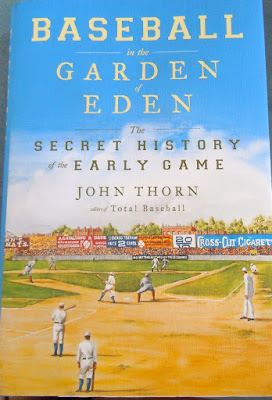John Thorn's Baseball in the Garden of Eden is sub-titled The Secret History of the Early Game. This is probably the most interesting presentation of 19th century baseball history available today, and probably the most truthful as it seems that a fair number of those preceding Mr Thorn were not quite telling "the truth, the whole truth, and nothing but the truth."Mr Thorn carries the honor of being the Official Baseball Historian for Major League Baseball.
I like the well-written though apparently scholarly way he goes about his business but then every once in awhile excitedly inserts himself into the dusty search of the archives in a surprising way. If Ken Burns, Jim Bouton and George Will all write glowing blurbs then you probably have the real stuff in your book. There are some very useful end-notes and acknowledgements.
It turns out that to get at the real beginnings of the game you have to start later and then work your way backwards, so that is why the book covers the 19th century exhaustively, even going well into the 1930s and the building of the National Baseball Hall of Fame and Museum in Cooperstown NY.
I hate to have to admit this but before I started reading this book I did not recognize the name of the author. I looked up Doug Glanville on Google and sure enough there he was just like his book said he was.
One of the reasons I like baseball is that, like cricket earlier, it has a literature starting in the early part of the 20th century, and at least some of the best players are insightful enough to write really good books. This is one of those.
Glanville is an Ivy League graduate, from the Univ. of Pennsylvania, and played centerfield for the Phillies, Cubs and Rangers between 1996 and 2004. 1999 was his best year, hitting .325, 11 home runs, 73 RBIs, and stealing 34 bases. He seems to be painfully honest in his analysis of himself and others playing at this level, both physically and mentally.
This is a small experiment in the blogosphere. "If you have no interest in what it's like to grow old, what follows is not for you. However, if it's going to happen to you, and the outcome is ultimately going to be negative, then finding a way to make the process as bearable, even as enjoyable as possible, might be worth a little attention."—from John Jerome's On Turning Sixty-Five
Subscribe to:
Post Comments (Atom)
Downtown Phoenix

Downtown Phoenix in the Winter Time
Good Cheese Here

Vermont Cheddar & Minnesota Blue
TAKE TIME FOR PARADISE
Me and Joan

Early elderly and middle middle age: We May Know Something You Don't
Mrs America

Fortunately these girls had a good-looking mother
Rimrocks @ Billings MT

“In beholding old stones we may feel our anxieties about our achievements–and lack of them–slacken . . . Vast landscapes [and seascapes] can have an anxiety–reducing effect similar to ruins, for they are the representatives of infinite space, as ruins are the representatives of infinite time, against which our weak, short-lived bodies seem no less inconsequential than those of moths or spiders.”—Alain de Botton in Status Anxiety
Easter Sunday at St Patrick's Co-Cathedral

12 April 2009
Pleasant Hillside at Hustisford, AKA The Grassy Knoll for you conspiracy buffs

A Lot of Muellers Are Buried Here





1 comment:
Another reason I like baseball is that someone, somewhere, keeps records that I would never have guessed were available. See, for example, today's Wall Street Journal which has a little trivia tidbit in it: On the last time a pitcher with an 0-6 or worse record was bested by someone with a 4-0 or better record. C'mon man. That is so detailed I shiver thinking about it.
Post a Comment